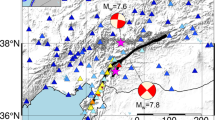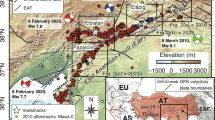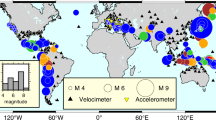Abstract
EARTHQUAKE shocks occurred in Worcester at 3.35 and at 5.31 a.m. on Thursday. The 3.35 shock was feeble, of short duration, and was noticed but by few persons. But the visitation of 5.31 exceeded in violence any previous instance of seismic energy here within the present century. There were in the 5.31 instance two shocks following each other with a bare interval. The shocks consisted of a series of rapid vibrations, too rapid to admit of count. These shocks were preceded by a, roar as of thunder. Some describe the roar as that of the noise of a “rushing mighty wind.” My house was shaken with appalling violence, displacing roof tiles, and forcing open a closed chamber door. To me the shocks seemed to proceed from north to south. The duration of the shocks lasted between four and five seconds. Some say the shocks lasted fifteen seconds; but if the earthquake had lasted so long, my house, would have been down. As it was the house was rocked to its foundation, and the sensation was appalling. Persons whose bedrooms faced the north, saw a great light accompanying the earthquake. This peculiarity is by some attributed to lightning, by others to the effect of a large meteor. Mr. Russell Dirrell, of North Piddle, a place seven miles east of Worcester, saw at the time of the earthquake a great blaze of light low in the northern horizon, continuing for two or three seconds. He was unable to attribute the blaze to a lightning effect. At the homestead of Mr. Walters, of Hallow, three miles north of Worcester, the inmates were thrown out of bed, as was the case in several other instances in the same village. Here the shocks were most severely felt at places on the west of the Severn. In Worcester the shocks created general alarm. Bells were set ringing, shut doors forced open, windows rattled, heavy wardrobes displaced, earthenware scattered about, in some, instances broken, but no one was injured. A strong fixed wash-hand basin in a lavatory was split to pieces. The church clock of All Saints, on the east of the Severn, was stopped at 5.15 a. m. As seems to be usual in such cases, poultry and pheasants flew down from their perches-and showed signs of distress, birds flew aimlessly about and clamoured. Graziers noticed that their milch cows were greatly trembling and seemed dazed, and horses ran about the pastures. During the shocks the river Severn here suddenly surged and angrily foamed up to the level of its banks, subsiding to its former level on the cessation of the 5.31 shocks. At Hallow, a labourer stooping to lace his boots was pitched headlong into the fire.
This is a preview of subscription content, access via your institution
Access options
Subscribe to this journal
Receive 51 print issues and online access
$199.00 per year
only $3.90 per issue
Buy this article
- Purchase on SpringerLink
- Instant access to the full article PDF.
USD 39.95
Prices may be subject to local taxes which are calculated during checkout
Similar content being viewed by others
Author information
Authors and Affiliations
Rights and permissions
About this article
Cite this article
BOZWARD, J. The Earthquake of December 17. Nature 55, 178–179 (1896). https://doi.org/10.1038/055178b0
Issue date:
DOI: https://doi.org/10.1038/055178b0



